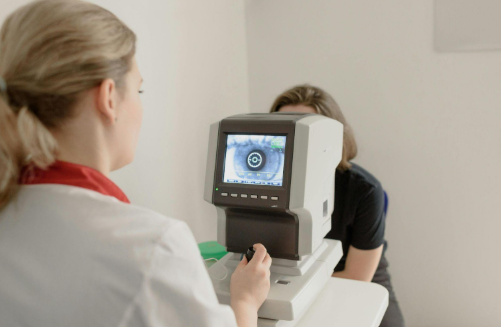Article
Understanding Inflammatory Eye Diseases: Awareness and Prevention
When we think about eye health, we often focus on common issues like blurry vision, cataracts, or needing glasses. But one important area of eye health that many patients aren’t as familiar with is inflammatory eye disease. These conditions can cause redness, pain, blurred vision, and—if left untreated—even permanent damage. The good news is that with awareness, prevention, and expert care, most inflammatory eye diseases can be managed successfully.
What Are Inflammatory Eye Diseases?
Inflammatory eye diseases refer to a group of conditions where the body’s immune system causes swelling, redness, or irritation in or around the eye. Sometimes this inflammation is a response to infection, but in many cases, it’s linked to autoimmune conditions where the immune system mistakenly attacks healthy tissues.
Some of the more common inflammatory eye conditions include:
- Uveitis – inflammation of the middle layer of the eye (uvea), which can lead to pain, light sensitivity, and blurred vision.
- Scleritis – inflammation of the sclera, the white part of the eye, often causing severe pain and redness.
- Keratitis – inflammation of the cornea, which may be linked to infections, contact lens use, or autoimmune disease.
- Conjunctivitis (Pink Eye) – often caused by infections, but sometimes triggered by allergies or inflammation.
- Blepharitis – inflammation of the eyelids that can cause itching, burning, or crusting.
Symptoms to Watch For
Inflammatory eye diseases don’t always start the same way. However, some common symptoms include:
- Persistent redness in one or both eyes
- Eye pain or soreness
- Sensitivity to light
- Blurred or decreased vision
- Floaters (small dark shapes that move across your vision)
- Excessive tearing or discharge
If you experience any of these symptoms, especially if they appear suddenly or are severe, it’s important to contact an eye doctor right away. Early treatment can prevent long-term complications.
What Causes Inflammatory Eye Disease?
There are several potential causes:
- Autoimmune conditions – Diseases like rheumatoid arthritis, lupus, or inflammatory bowel disease can trigger eye inflammation.
- Infections – Bacterial, viral, or fungal infections can inflame different parts of the eye.
- Injury or trauma – Even a small eye injury can sometimes set off inflammation.
- Environmental factors – Allergies, dry environments, or irritants like smoke can worsen symptoms.
- Unknown causes – Sometimes, the exact reason for inflammation isn’t clear, but treatment is still necessary to protect vision.
Why Early Detection Matters
Your eyes are delicate, and inflammation can damage them more quickly than many people realize. Untreated inflammatory eye disease can lead to complications such as:
- Glaucoma (damage to the optic nerve from pressure in the eye)
- Cataracts (clouding of the lens)
- Retinal damage
- Permanent vision loss
This is why regular eye exams are so important. At EyeCare Associates of Texas, we emphasize early diagnosis and treatment to protect, preserve, and restore your vision.
Prevention and Lifestyle Tips
While not every case of eye inflammation can be prevented, there are steps you can take to reduce your risk:
- Keep up with routine eye exams. Regular checkups allow your doctor to detect problems early—even before symptoms appear.
- Manage chronic health conditions. If you have an autoimmune disease, diabetes, or high blood pressure, follow your doctor’s care plan to reduce complications that may affect your eyes.
- Practice good hygiene with contact lenses. Always clean, store, and replace lenses as directed to prevent infections.
- Protect your eyes. Wear safety glasses during work or sports and sunglasses outdoors to shield against UV rays.
- Avoid eye irritants. Limit exposure to smoke, dust, or harsh chemicals.
- Don’t ignore symptoms. Even minor redness or irritation should be checked if it doesn’t improve quickly.
How Inflammatory Eye Diseases Are Treated
Treatment depends on the cause and severity of the inflammation. Options may include:
- Prescription eye drops – to reduce inflammation or treat infection.
- Oral medications – such as anti-inflammatory drugs or antibiotics.
- Steroid treatments – to control severe inflammation.
Surgery – in rare cases where complications develop.
The goal is always to relieve symptoms, stop damage, and protect your long-term vision. With expert care, most patients find significant relief and maintain healthy vision.
Why Choose EyeCare Associates of Texas, P.A.
For more than 50 years, Eye Care Associates of Texas, P.A. has been a trusted leader in advanced eye care across Cedar Hill, Grand Prairie, and the greater Dallas area. Our board-certified ophthalmologists and optometrists provide personalized care, using the latest technology to diagnose and treat conditions like inflammatory eye diseases, cataracts, glaucoma, diabetic eye disease, and more.
Our mission is to help you and your family enjoy a lifetime of healthy vision through early diagnosis, proven treatments, and compassionate care.
Final Thoughts
Inflammatory eye diseases can sound intimidating, but with awareness, prevention, and timely treatment, most patients can protect their vision and live comfortably. Your eyes are too important to take chances with—if you notice redness, pain, or changes in your vision, don’t wait. The sooner you get checked, the better your chances of avoiding complications.
Contact us today.
share this
Related Articles
Related Articles





